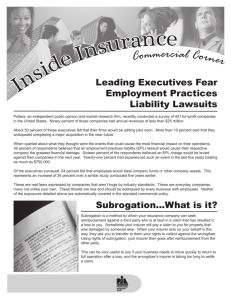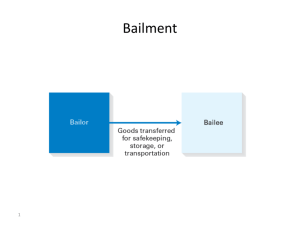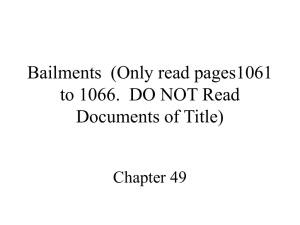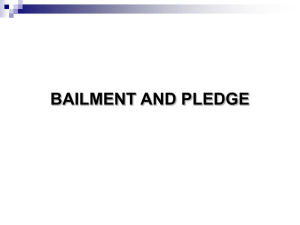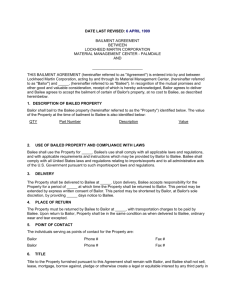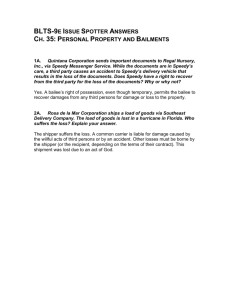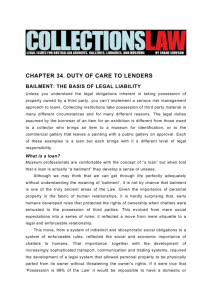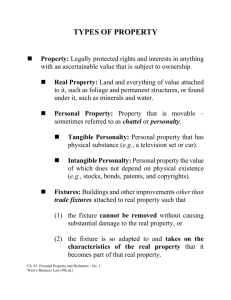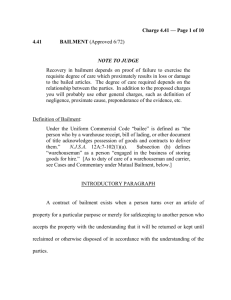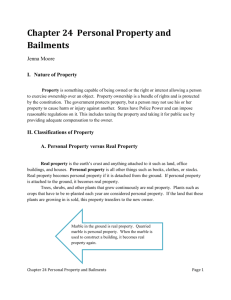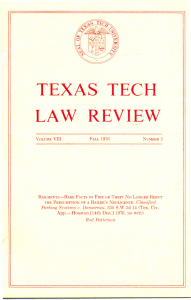Bailment - ViperFusion
advertisement
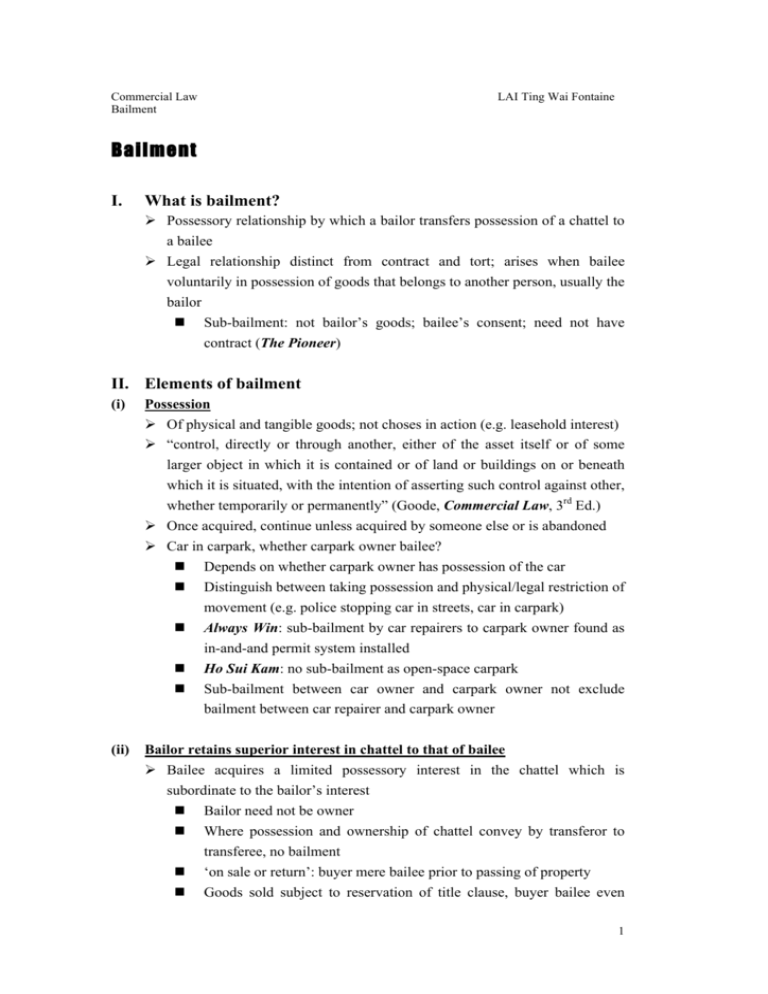
Commercial Law Bailment LAI Ting Wai Fontaine Bailment I. What is bailment? ! Possessory relationship by which a bailor transfers possession of a chattel to a bailee ! Legal relationship distinct from contract and tort; arises when bailee voluntarily in possession of goods that belongs to another person, usually the bailor " Sub-bailment: not bailor’s goods; bailee’s consent; need not have contract (The Pioneer) II. Elements of bailment (i) Possession ! Of physical and tangible goods; not choses in action (e.g. leasehold interest) ! “control, directly or through another, either of the asset itself or of some larger object in which it is contained or of land or buildings on or beneath which it is situated, with the intention of asserting such control against other, whether temporarily or permanently” (Goode, Commercial Law, 3rd Ed.) ! Once acquired, continue unless acquired by someone else or is abandoned ! Car in carpark, whether carpark owner bailee? " " Depends on whether carpark owner has possession of the car Distinguish between taking possession and physical/legal restriction of " movement (e.g. police stopping car in streets, car in carpark) Always Win: sub-bailment by car repairers to carpark owner found as " " (ii) in-and-and permit system installed Ho Sui Kam: no sub-bailment as open-space carpark Sub-bailment between car owner and carpark owner not exclude bailment between car repairer and carpark owner Bailor retains superior interest in chattel to that of bailee ! Bailee acquires a limited possessory interest in the chattel which is subordinate to the bailor’s interest " Bailor need not be owner " Where possession and ownership of chattel convey by transferor to transferee, no bailment " ‘on sale or return’: buyer mere bailee prior to passing of property " Goods sold subject to reservation of title clause, buyer bailee even 1 Commercial Law Bailment LAI Ting Wai Fontaine though may be given power to sell goods to sub-buyer or use them in manufacturing process (Clough Mill) ! Possible to have bailment where bailee authorised to substitute other goods for those bailed " Money in bank not bailment; bank only owes personal obligation to repay debt; unsecured creditor when bank bankrupt (Foley) " Usually when loan fungible goods (e.g. grain, flower), not retain proprietary interest, entitled to return another grain/flowers; unsecured creditor when borrower bankrupt # Mercer (HL): Grain storage society held to be bailee of grain deposited by farmers, even though the grain delivered by any particular farmer was commingled, with the farmer’s consent, with grain delivered by other farmers creating an indistinguishable mass which was subject to continual additions and withdrawals; farmers retained property of grower under " agreement May exist even if contemplated changes will be made to chattel during bailment # No bailment if change in basic nature of chattel contemplated (iii) Bailee’s consent ! Consent to possession of chattel (voluntary), regardless of whether bailor consented " " The Pioneer: For sub-bailee to have voluntarily taken into his possession the goods of another (in addition to his duties to the bailee) if he has sufficient notice that a person other than the bailee is interested in the goods # Can only invoke terms made with bailee if owner has actually (expressly or impliedly) or even ostensibly authorised bailee to agree to those terms (and thus has consented to the terms) (not necessary to be done on behalf of owner) ‘any person who voluntarily assumes possession of goods belonging to another will be held to owe at least the principal duties of the bailee at common law’ (Palmer) 2 Commercial Law Bailment LAI Ting Wai Fontaine III. Bailee’s liability (i) Bailee’s duty (Houghland cf. Port Swettenham (accepted in China National)) (1) Exercise reasonable care of goods in custody as in the circumstances (2) Take responsibility for damage done / theft by 3p (3) Duty to take reasonable steps to secure recovery of goods in the " circumstances Note: fact that bailment is gratuitous may be relevant when assessing whether bailee exercised reasonable care ‘in all the circumstances’ (ii) BOP on bailee to show all reasonable steps taken in circumstances (1) (2) To care for goods If stolen, to recover (iii) Defence " Damage/loss would happen even if reasonable care taken (iv) Where standard of care raised (1) Common carrier: strict liability # Unless loss/damage caused by excepted peril (e.g. Act of God, inherent vice) # # Unless avoided by contractual exemption clauses Unless assumption of status of private carrier # Unless statute permit or prescribe ways by which liability may be excluded or limited (2) Where bailee deviates in the conduct of the bailment: strict liability (e.g. entrust to sub-bailee without authorisation, carry bailment by another route) # Unless would have occurred even without deviation (3) Where bailee refuses or inexcusably fails to surrender goods at the end of the bailment (also for bailment at will, surrender as and when requested) # Standard of care during bailment: reasonable care in all the circumstances # After authorised period: strict liability; liability of insurer; liable if goods stolen, even if no amount of care would have prevented the theft 3 Commercial Law Bailment LAI Ting Wai Fontaine If bailee himself damages/fails to return goods: ordinary tort of trespass and detinue If damage/theft by 3p, see whether standard of care breached; look at bailment relationship Hire-purchase Bailment until hirer exercises a future and contingent option to purchase IV. Bailee and Third Parties ! Bailor at will and bailee can sue 3p " Term bailor cannot sue during term bailment as no right to immediate possession " Exception: 1. 2. Bailment at will Bailee commits a wrongful act amounting to repudiation of bailment (e.g. deviation in conduct of bailment, destroying subject matter of bailment, contract of bailment provides that bailor has immediate right to terminate bailment for any breach of its terms (North General; cf. normal contractual principles)) ! As against the wrongdoer, possession is title (The Winkfield) " Possession sufficient to bring action for trespass, conversion, detinue or negligence " Bailee entitled to recover complete equivalent for the whole loss or deterioration of the chattel (The Winkfield) and damages for " consequential loss unless to remote Three exceptional situations where wrongdoer may raise another person’s superior title to chattel as defence against an action brought by bailee: 1. When wrongdoer defends action on behalf of, and with the authority of, true owner 2. When wrongdoing committed with authority of true owner 3. When wrongdoer has, since the time of wrongdoing, become owner of the goods ! Bailee’s obligation to account to bailor is not relevant in the discussion of 3p’s liability to bailee (The Winkfield) " Relevant only after bailee has carried his legal position to its logical consequence against a wrongdoer (The Winkfield) 4 Commercial Law Bailment LAI Ting Wai Fontaine ! Bailee to account to bailor what he has received above his own interest (The Winkfield) ! Wrongdoer, once paid full damages to bailee/bailor, has an answer to any action by bailor/bailee (The Winkfield; O’Sullivan) 5
